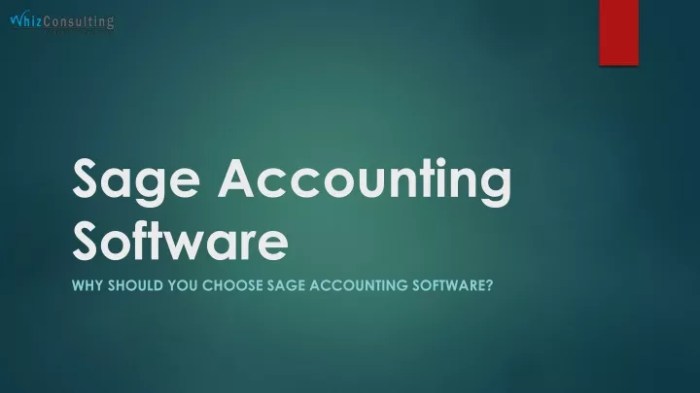What is sage accounting software used for – Sage accounting software is a popular choice for businesses of all sizes, from small startups to large enterprises. But what exactly
-is* it used for? This comprehensive guide delves into the multifaceted applications of Sage accounting software, exploring its features and benefits across various industries and business needs. We’ll cover everything from basic accounting tasks to advanced functionalities, ensuring you have a clear understanding of its capabilities.
Core Functions of Sage Accounting Software: What Is Sage Accounting Software Used For
At its heart, Sage accounting software automates and streamlines core accounting processes. This includes:
Invoicing and Billing, What is sage accounting software used for
- Creating and sending invoices: Sage allows you to quickly generate professional-looking invoices, customize them with your logo and branding, and send them electronically or via print.
- Tracking payments: The software facilitates efficient payment tracking, recording payments received, and identifying outstanding invoices.
- Managing overdue invoices: Sage provides tools to manage late payments, send reminders, and track outstanding balances effectively.
- Generating reports on sales and outstanding invoices: Gain valuable insights into your sales performance and cash flow with comprehensive reporting features.
Financial Reporting
Sage offers robust reporting capabilities, providing crucial insights into your business’s financial health. This includes:
Financial Statements
- Profit & Loss Statements (P&L): Understand your revenue, expenses, and profitability over specific periods.
- Balance Sheets: Track your assets, liabilities, and equity to gain a snapshot of your financial position.
- Cash Flow Statements: Monitor your cash inflows and outflows to ensure sufficient liquidity.
Other Key Reports
- Aged Receivables Reports: Analyze outstanding invoices and identify potential collection issues.
- Aged Payables Reports: Manage your outstanding payments to suppliers.
- Customizable Reports: Tailor reports to meet your specific needs and gain deeper insights into your business performance.
Inventory Management (for applicable Sage versions)
Many Sage versions include inventory management features, allowing businesses to:
- Track inventory levels: Maintain accurate records of stock on hand.
- Manage stock movements: Record purchases, sales, and adjustments to inventory.
- Generate inventory reports: Analyze stock levels, identify slow-moving items, and optimize inventory control.
- Integrate with point-of-sale (POS) systems: Streamline inventory management by connecting directly to your POS system.
Beyond the Basics: Advanced Features of Sage Accounting Software
Depending on the specific Sage product you choose (e.g., Sage 50cloud, Sage Business Cloud Accounting, Sage Intacct), you’ll find access to a range of advanced features. These can significantly enhance your business operations:

Source: slideserve.com
Payroll Management (for applicable Sage versions)
Sage payroll solutions simplify payroll processing, ensuring accurate and timely payment to employees. Features often include:
- Calculating employee wages and deductions: Automate payroll calculations, including taxes and other deductions.
- Generating payslips: Produce accurate and compliant payslips for your employees.
- Filing tax returns: Simplify tax compliance by integrating with relevant tax authorities.
- Managing employee benefits: Track and manage employee benefits, such as health insurance and retirement contributions.
Project Management (for applicable Sage versions)
Some Sage solutions offer project management capabilities, allowing you to:
- Track project progress: Monitor project timelines, budgets, and resources.
- Manage project costs: Control project expenses and ensure profitability.
- Collaborate with team members: Share project information and facilitate communication among team members.
CRM Integration (for applicable Sage versions)
Integrating Sage with a Customer Relationship Management (CRM) system allows for seamless data flow between your accounting and customer management systems. This can lead to improved customer service and sales management.
Cloud-Based Accessibility
Many Sage solutions are cloud-based, offering accessibility from anywhere with an internet connection. This enhances collaboration and allows for real-time data access for authorized users.
Choosing the Right Sage Accounting Software
Sage offers a variety of software solutions tailored to different business needs and sizes. Careful consideration of your specific requirements is crucial in selecting the appropriate product. Factors to consider include:
- Business size and complexity: Select a solution that can handle your current and future needs.
- Industry-specific requirements: Some Sage solutions cater to specific industries, offering tailored features.
- Budget: Sage offers a range of pricing options to suit different budgets.
- Integration capabilities: Consider the need for integration with other software systems, such as CRM or POS.
Frequently Asked Questions (FAQs)
- Q: Is Sage accounting software suitable for small businesses? A: Yes, Sage offers various solutions designed specifically for small businesses, providing essential accounting features at an affordable price.
- Q: How much does Sage accounting software cost? A: The cost varies depending on the chosen product and its features. It’s best to check the Sage website for current pricing.
- Q: Is Sage accounting software user-friendly? A: Sage strives for user-friendly interfaces, but the ease of use can depend on the specific product and your prior accounting experience. Many offer tutorials and support resources.
- Q: Can I access Sage accounting software from anywhere? A: Cloud-based Sage solutions allow access from any device with an internet connection.
- Q: Does Sage integrate with other software? A: Many Sage products offer integration capabilities with other business software, such as CRM and POS systems.
Conclusion
Sage accounting software offers a comprehensive suite of tools to manage various aspects of your business finances. From basic accounting tasks to advanced features like payroll and project management, Sage can significantly improve efficiency and provide valuable insights into your financial performance. Choosing the right Sage product depends on your specific needs and budget. Explore the various options available on the Sage website to find the perfect fit for your business.
Ready to streamline your accounting processes? Visit the Sage website today for a free trial or to learn more!
FAQs
What are the different versions of Sage accounting software?

Source: theknowledgeacademy.com
Sage offers various versions tailored to different business sizes and needs, ranging from Sage 50cloud for small businesses to more comprehensive solutions like Sage 300 and Sage X3 for larger enterprises.
Is Sage accounting software cloud-based?
Many Sage products offer cloud-based options, allowing access to financial data from anywhere with an internet connection. However, some versions are also available as on-premise solutions.
How much does Sage accounting software cost?

Source: sage.com
Pricing varies depending on the specific version and features chosen. It’s best to contact Sage directly or a reseller for accurate pricing information.
Does Sage integrate with other software?
Yes, Sage integrates with many other business applications, including CRM systems, payroll software, and e-commerce platforms, to streamline workflows.
What kind of support does Sage offer?
Sage typically provides various support options, including online help resources, phone support, and potentially on-site support depending on the service agreement.
